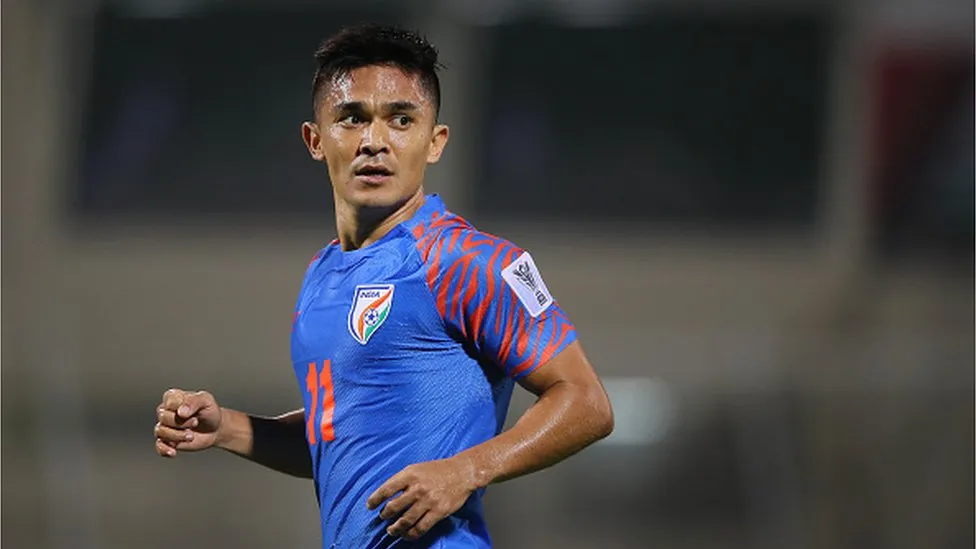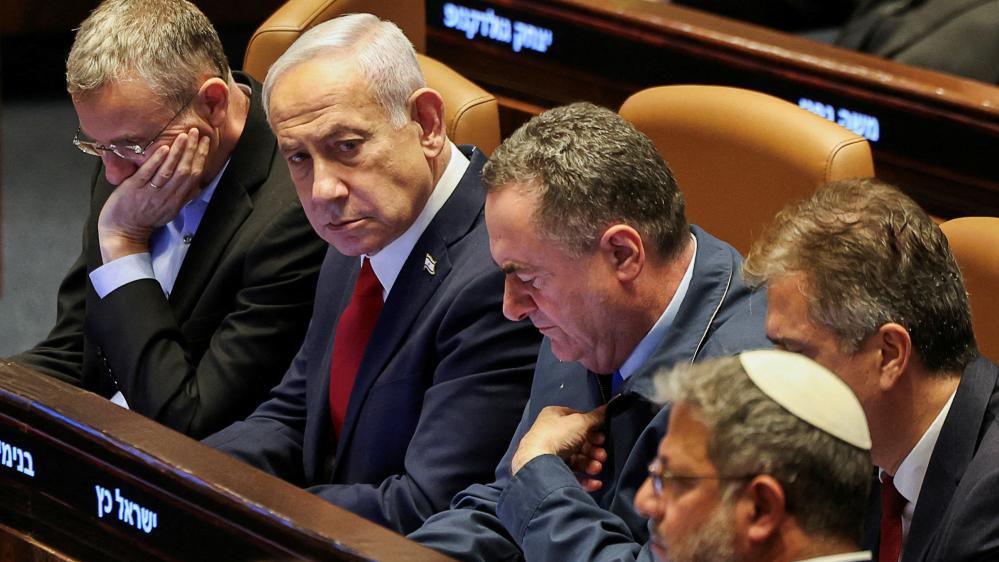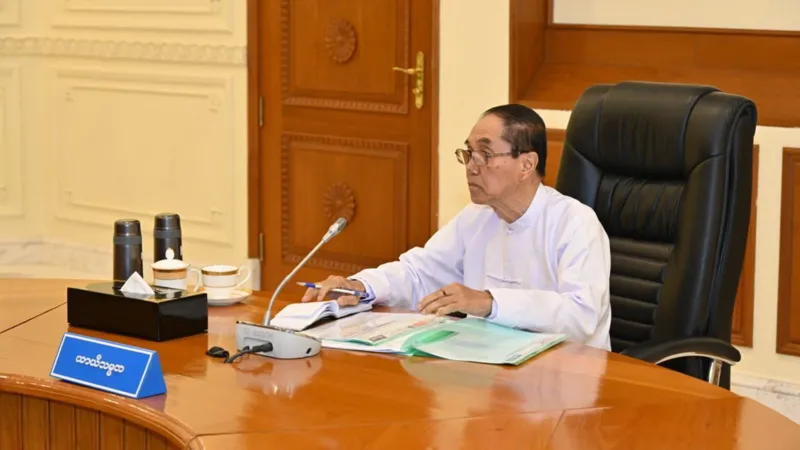Sunil Chhetri: Indian footballer in the same league as Messi and Ronaldo
On Tuesday, the Indian football team won its ninth South Asian Football Federation Championship (SAFF) title after beating Kuwait on penalties. At the centre of the triumph was one man - Indian captain Sunil Chhetri. He has served Indian football for close to two decades, inspiring a generation of players. Sports writer Gautam Bhattacharyya traces the player's glorious journey.

A question that the motley team of football writers from India, who travel to cover the Fifa World Cup, often face is: does their country really play football?
The element of surprise is not unexpected. Despite its reputation as a huge market for football tourism, India has not been able to shed its tag of being a cricket-crazy nation.
But this is where Sunil Chhetri, the long serving Indian captain, stands out.
The 38-year-old goal machine, who led his country to a modest Inter-continental Cup and SAFF Championship over last three weeks, is currently the third highest scorer of international goals among active footballers.
He has 93 strikes from 142 matches - the top two positions belonging to Cristiano Ronaldo (123 goals from 200 caps) and Lionel Messi (103 from 175).
Take the all-time list and Chhetri is ranked fourth with Iranian legend Ali Daei ahead of him with 109 goals from 148 matches.
What makes his story all the more exceptional is that the list of all-time best 10 footballers is populated by stars from countries with an impeccable football lineage - where Hungarian legend Ferenc Puskas holds the sixth position (84 goals) and Robert Lewandowski of Poland is ranked eighth (79 goals).
Compare that to the footballing credentials of the country Chhetri comes from. The last time India had a podium finish in a major championship was a bronze more than 50 years back in the 1970 Asian Games, while their Fifa ranking has hovered around the 100-mark for as long as one can remember.
The Blue Tigers - as the national team is called - acquitted well for themselves by qualifying for two Asian Cup finals on the trot now, though a qualifying berth in the World Cup from Asia has remained a pipe dream.
It's in this ecosystem that Chhetri thrives, and does so with a tremendous sense of pride for his jersey.
His achievements have not gone entirely unrecognised - Fifa produced a documentary on him called Captain Fantastic last year, which is available on the Fifa+ channel.
Every conversation with Chhetri inevitably boils down to him being in the goal-getters' race with the two superheroes of the game: Ronaldo and Messi.
Chhetri borrows the words of Bob Houghton - a respected British coach under whom he began his journey in Indian colours - to put things in perspective: "You cannot have the skills of Ronaldo or score goals like him, but nobody can stop you from working hard as him."
Nice words those, but how does he maintain an impressive goal-scoring ratio for a country whose staple participation comes mainly from smaller tournaments, such as the SAFF Championship, Intercontinental Cup, Asian Cup qualifiers or Asian Cup finals and friendlies?
The Asian Games have remained out of bounds since Chhetri's arrival on the scene, while the Nehru Cup - an invitational meet where he has nine goals - has also been discontinued.
The SAFF Championship, which India won after a shootout in the final against Kuwait in Bengaluru on Tuesday, has accounted for nearly 25% of his goals so far (24).
Of these, 18 came in friendlies, 13 in the Intercontinental Cup, nine in Fifa World Cup qualifiers and the Nehru Cup apiece, while the remaining were scored in AFC events and the King's Cup.
He has had four hat-tricks so far, including one against Pakistan at SAFF. Yes, there could be the odd snigger at the quality of some of the opposition, but then there are no freebies in international football.
It's much to Chhetri's credit that after all these years, he still remains the go-to man for the Blue Tigers for scoring goals - and he has retained the hunger for it. The recently concluded SAFF Championship bears testimony to that.
He started off with the hat-trick against Pakistan in their opening game and had six goals in all - a strike rate which speaks of phenomenal consistency and focus. But it also raises a question: "After Chhetri, who?''
There are no prizes for guessing that his longevity in international football, along with his work ethic, are the key factors behind Chhetri's success.
Sample this: the 2022-23 season was his 18th year at international level and 21st at the club circuit. It was in June 2005 that Chhetri earned his first international cap - the same year as Messi, and two years after the mighty Ronaldo.
In a freewheeling chat with me last year during India's Asian Cup qualifiers in Kolkata, Chhetri explained what has kept him going: ''It's all about making the small sacrifices in the end."
"It's all about what I eat and how much I sleep. For the kind of good life that I have got by God's grace, it's not a big deal to go for the broccolis rather than the biryani - as I know there will be enough time for such indulgence once I am done with the game. There had been several players who started off around my time and were at my level or even better. But they could not sustain the physical demands [of the game]," he said.
However, his years of experience at international and club level has helped him to understand his body better and make subtle tactical changes to prolong his career.
In the last edition of Indian Super League (ISL), the talismanic Chhetri was no longer an automatic choice in the starting XI for his club team Bengaluru FC, coming on more often as a super sub.
This is something which kept him fresh for the rigours of national duty. He did not function in the same pace as before - choosing to lurk by and then breaking into critical, short bursts of speed to reach the ball, when it mattered the most.
Speaking about their chances in the Asian Cup in Doha in January (where India has been grouped with World Cup regulars Australia, Uzbekistan and Syria), Chhetri said: "It's evidence of the progress we have made and a big step forward. At the same time, it is a small step in the context of where we want to be. If you take top Asian teams - Japan, Iran, Saudi Arabia - you will see they always want to play with better and higher ranked teams. That's how you improve. At the Asian Cup we will play higher ranked teams. That's when you can judge your progress, how much you have improved as a team.''
The qualifiers for the 2026 Fifa World Cup, which will have a bigger field of 48 teams, will begin in September.
Chhetri, who has just received a one-year contract extension with his club and plans to carry on as long as he is enjoying the game, will surely be a part of this campaign too - though the time to walk into the golden sunset is certainly not far off.
But for now, no-one, including the team's Croatian coach Igor Stimac, has the answer to that "who-after-Chhetri" question.
Neither do the fans.
-bbc






